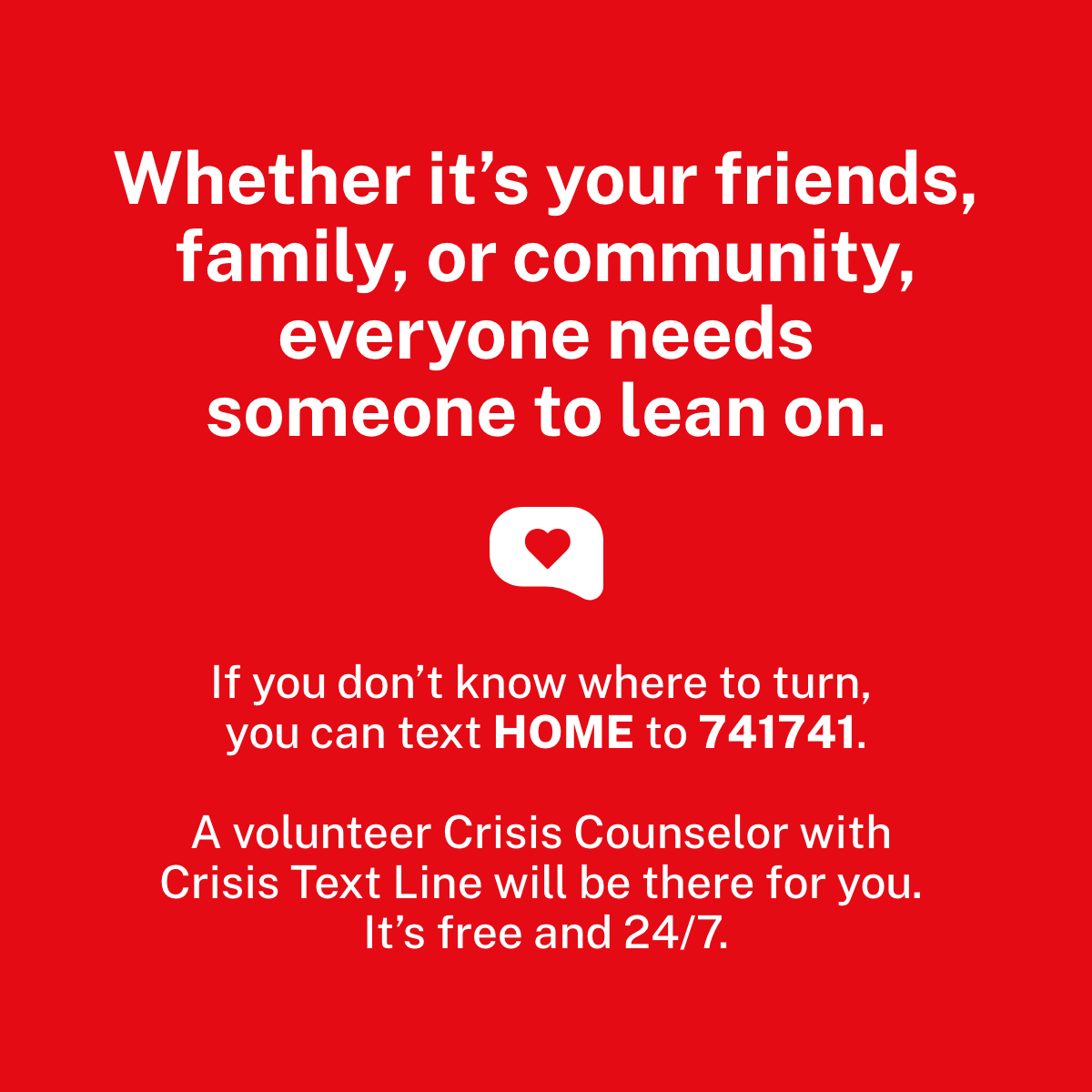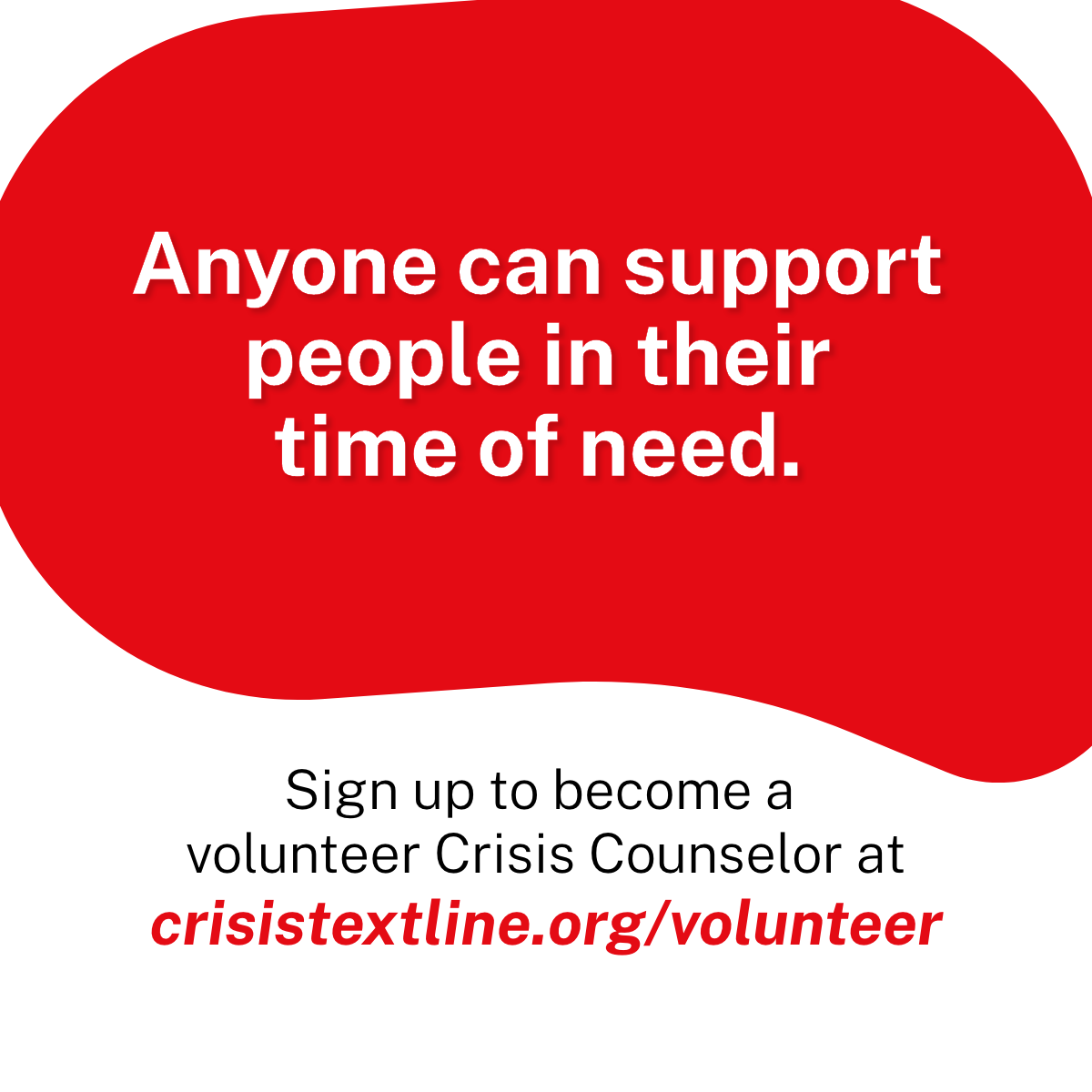Depression


Understanding and Managing Depression
Text CONNECT to 741741 for free, confidential support from a trained volunteer Crisis Counselor, available 24/7.
Feeling depressed? Text CONNECT to 741741 for free, 24/7 support.
Depression is more than just a tough day. It’s a heavy burden, but you don’t have to carry it alone. We’re here to help and keep people safe. Our trained volunteer Crisis Counselors can provide immediate support and guide you toward finding healthy ways to cope with depression.
Free Depression Help #
Feeling overwhelmed or stuck and need someone to talk to about depression? Crisis Text Line offers free, 24/7 crisis counseling to help you through tough moments. Text CONNECT to 741741 to immediately reach a trained volunteer Crisis Counselor who’s ready to listen and support you. You’re not alone—we’re here to help.
What is Depression? #
Depression can feel like a dark cloud that follows you, making even small tasks seem impossible. It’s a mental health condition that affects people differently, but often includes persistent sadness, low energy, and a loss of interest in things you once loved.
The good news? You don’t have to face it alone. Asking for help could allow you to unlock the tools to navigate through it. Depression is more common than you might think. According to our fifth annual United in Empathy report, 30% of conversations with Crisis Text Line involved depression in 2023. By seeking help, you take a powerful step toward breaking the stigma and finding light in the darkness.
Risk Factors and Causes #
Depression can arise from various factors, including:
- Family or personal history of mental health challenges
- Major life changes or trauma (e.g., losing a loved one, ending a relationship, or moving)
- Chronic illness, medication side effects, or substance use
- Experiences of discrimination or inequality
- Hormonal changes, particularly in women aged late teens to early 30s
Living with Depression #
Depression can feel like navigating a foggy maze where even the simplest tasks become overwhelming. It’s a common experience, where it’s episodic or persistant. Depression often intersects with stress, anxiety, or loneliness, amplifying its impact.
Anxiety can fuel restlessness, excessive worry, and a constant sense of unease, further burdening individuals with depression. Conversely, depression can give rise to fear, agitation, and an overwhelming sense of dread. Addressing both conditions may involve a comprehensive approach that combines therapy, medication, self-care practices, and social support.
Questions about Depression #
Here are answers to some common questions:
- Why do people get depressed?
People can get depressed due to a combination of various factors, including genetic predisposition, chemical imbalances in the brain, life events or trauma, chronic stress, and certain medical conditions. - Why does my depression come and go?
Depression can come and go due to its cyclical nature. Some individuals may experience episodes of depression followed by periods of remission, while others may have chronic or recurring depression. Factors such as stress, life events, lack of self-care, or inadequate treatment can contribute to the fluctuating nature of depression. - Can you self-diagnose depression?
While it’s important to be aware of your mental health and seek professional help, self-diagnosing depression is not recommended. A proper diagnosis involves a comprehensive evaluation by a mental health professional who can assess your symptoms, medical history, and provide an accurate diagnosis and treatment plan. - Why does depression make you tired?
Depression can make you feel tired due to disruptions in sleep patterns, changes in brain chemistry, and a lack of motivation or energy that often accompanies the condition. The emotional burden of depression can also contribute to fatigue and a sense of heaviness or lethargy. - Does depression last forever?
Not necessarily. It can vary in duration and intensity from person to person. With appropriate treatment, support, and self-care strategies, many individuals can experience relief from depressive symptoms and achieve recovery. It’s important to seek professional help to explore treatment options. - Can you recover from depression?
Yes, it is possible to recover from depression. Recovery may involve a combination of treatments, such as therapy, medication, lifestyle changes, and social support. It’s a journey that takes time and effort, but many individuals have successfully overcome depression and regained their sense of well-being. - Does it get better?
While everyone’s experience is unique, for many people, things do get better with proper support and treatment. Recovery from depression is possible, and individuals often find relief from symptoms and regain a sense of hope, joy, and overall well-being. It’s important to reach out for help and surround yourself with a supportive network of professionals and loved ones.
Types of Depression #
Understanding the different types of depression can help you or a loved one identify what’s going on and take the first step toward support. Here are some common types:
- Major Depression: According to the National Institute of Mental Health, this is the most common type of depression, and is characterized by two or more weeks of depression symptoms like deep sadness, feelings of worthlessness, guilt, and a lack of interest in activities you once loved.
- Bipolar Disorder: Although not the same as depression, Bipolar Disorder often includes depressive episodes. These can range from extreme lows to emotional highs, creating challenging cycles.
- Postpartum Depression: Having a baby can change the hormones in one’s body. Sometimes, this hormonal change can trigger symptoms of depression, impacting emotional well-being and daily life. According to the World Health Organization (WHO), about 13% of mothers will experience postpartum depression.
- Premenstrual Dysmorphic Disorder (PMDD): Hormonal changes can be a wild ride for your brain and your body. PMDD is a type of depression that affects women during their period. It includes symptoms that are more severe than your usual premenstrual syndrome (PMS).
- Seasonal Affective Disorder (SAD): Sometimes, people can experience depression around major changes in seasons. Usually, people experience SAD during the shorter, darker days of winter. Often, SAD improves with the next change in seasons. That doesn’t mean you need to wait it out to get help. Reach out to your doctor. And, of course, send us a text, too.
Signs of Depression #
There are a few key symptoms that could indicate you are experiencing far more than your average sadness. Depressed thoughts, lifestyle changes, and physical symptoms can all signal depression. Recognizing these signs is an essential first step toward seeking help for yourself or a loved one. Let’s break them down:
Depressed Thoughts #
Depressive thoughts can cast a shadow over the mind, distorting perceptions and impacting emotional well-being. They can make you feel disconnected, hinder productivity, and create a profound sense of despair. Here’s what they might look like:
- I feel like nothing matters: Depression can distort your perspective, making everything seem meaningless and leading to apathy and indifference.
- I’m not feeling like myself: Depression can lead to a profound sense of disconnection from your identity, resulting in low self-esteem and a diminished sense of purpose.
- I’m too depressed to work: Depression can greatly affect one’s ability to function in daily life, including work or other responsibilities. The overwhelming sadness, lack of motivation, and difficulty concentrating can make it challenging to perform tasks,meet deadlines, and handle responsibilities.
- I feel depressed about life: Depression often brings about a pervasive feeling of hopelessness and despair about life in general. It can create a negative lens through which you view your circumstances, leading to a sense of bleakness and a loss of interest in the future.
Lifestyle Changes #
Depression can make even the simplest tasks feel overwhelming and unachievable. It may disrupt routines and social interactions, showing up in ways like these:
- Difficulty making decisions: Depression can cloud one’s ability to make decisions, even simple ones. The overwhelming feelings of sadness and lack of motivation can make it difficult to weigh options, leading to indecisiveness or avoidance of decision-making altogether.
- Can’t get out of bed: One of the hallmark symptoms of depression is a lack of energy and motivation, which can make it difficult to find the strength to get out of bed in the morning. The heaviness and fatigue associated with depression can make staying in bed feel like the only option.
- Can’t shower: Depression can affect personal hygiene, leading to a loss of interest or motivation to engage in self-care activities such as bathing or grooming. The lack of energy and low self-esteem can contribute to neglecting these basic self-care routines.
- Can’t get out of your own head: Intrusive, negative thoughts can consume your mind, making it challenging to focus or engage in external activities.
- No motivation to see friends or go out: Social withdrawal is a common consequence of depression. Feelings of sadness, emptiness, and low self-worth may lead to isolation.
Physical Symptoms #
Depression doesn’t just affect emotional well-being. It can actually make you physically ill. Subtle body language changes, like slumped posture or flat vocal tone lacking energy, may offer non-verbal cues of emotional distress. Other physical symptoms include:
- Digestive issues: Symptoms such as nausea, stomachaches, indigestion, bloating, or changes in bathroom habits may arise due to depression’s impact on the gastrointestinal system.
- Chronic fatigue or insomnia: Depression often disrupts sleep patterns, causing persistent fatigue or difficulty falling and staying asleep (insomnia).
- Appetite changes: You may notice a decrease in appetite or an increased dependence on food, which can result in changes in weight.
- Physical aches and pains: Depression can manifest as headaches, muscle pains, joint discomfort, or general body aches.
Managing Depression #
Living with depression often requires adapting to its challenges. While the journey is unique for everyone, these strategies may help:
- Develop coping skills for depression: Mindfulness, physical activity, creative outlets, or spending time in nature can help manage depressive episodes.
- Self-care for depression: Prioritizing self-care is essential when dealing with depression. Taking care of your physical and emotional well-being can help alleviate symptoms. This may involve establishing a consistent sleep routine, treating yourself to an at-home spa day, eating balanced meals, engaging in activities that bring joy, setting boundaries, and seeking support from loved ones.
- How to get out of bed when depressed: Getting out of bed can be a daunting task when you’re feeling depressed, but small steps can make a difference. Start by setting achievable goals, such as getting out of bed for a few minutes and opening the curtains to let in natural light.
- Things to do when depressed: Engaging in activities that provide a sense of fulfillment and distraction can help combat the weight of depression. It could be as simple as going for a walk, listening to a podcast, trying out a new hobby or creative outlet, watching a movie or TV show that brings joy, connecting with a friend or loved one, or practicing relaxation techniques.
- How to motivate yourself when you are depressed: Motivation can be a challenge , but gentle encouragement and self-compassion can help. Break tasks into smaller, manageable steps, set realistic goals, and give yourself credit for even the smallest accomplishments. Surround yourself with positive influences, seek inspiration from uplifting books or podcasts, and remind yourself that progress takes time. Remember to give yourself grace.
- Let someone in: When you’re depressed, likely the last thing you want to do is spend time with other humans. Maintaining key aspects of your social life can be a powerful way to manage your depression. Try letting even one friend in and telling them what’s going on. Need a place to start? Try sending them a text like this: “Hey, I’m having a hard time and could use some company. Want to hang out?”
- Talk to a pro: Mental health is important. Sometimes it requires doctors to help you figure out the best plan for you. It’s never too early to ask for help. Getting help from a pro could help you unlock tools and strategies to manage depression.
- If you ever need support, don’t forget to reach out to Crisis Text Line. Text CONNECT to 741741 for immediate assistance.
Treating Depression #
Treating depression often involves seeking professional help from medical experts who specialize in mental health. These professionals play essential roles in providing guidance, support, and appropriate treatment options. If you’ve ever asked yourself, “Who can I talk to about depression?” or wondered, “What does a psychiatrist do?”– here are some insights into how doctors, therapists, and psychiatrists approach treating depression:
- Talking to a doctor about depression: Your primary care physician can be an excellent first step in seeking help for depression. They can assess your symptoms, conduct necessary tests to rule out any underlying medical conditions contributing to your feelings, and provide initial guidance. They may also prescribe medications or refer you to a mental health specialist for further evaluation and treatment.
- Working with a therapist to address depression: Therapists, such as psychologists or licensed counselors, play a pivotal role in managing depression. Therapy provides a safe and supportive space to explore emotional challenges, learn coping strategies, and develop healthier thought patterns and behaviors. Therapists may utilize various therapeutic approaches, such as cognitive-behavioral therapy (CBT), interpersonal therapy (IPT), or psychodynamic therapy, tailored to your specific needs.
- Working with a psychiatrist to treat depression: Psychiatrists are medical doctors who specialize in mental health disorders. They can diagnose depression through comprehensive evaluation, prescribe medications if necessary, and provide treatment. Psychiatrists often work in collaboration with therapists to offer a holistic, balanced approach to managing depression, combining medication management with therapy to address both the biological and psychological aspects of the condition.
It’s important to communicate openly and honestly with your healthcare professionals about your symptoms, concerns, and treatment preferences. Together, they can help craft an individualized treatment plan tailored to your needs. Remember, the journey to treating depression is unique for each person and finding the right combination of care may take time. Seeking professional help is a crucial step towards finding the support and resources needed to work through depression.
Help for Depression #
You don’t have to deal with depression alone. Reaching out for help is a sign of strength, and there are ways to start working through depression:
How to Start Working Through the Sadness: #
- Text us. Opening up about what is going on in your life is an act of bravery. We’re ready to be brave with you. Connecting with a real human can help you process your feelings in the moment and strategize long-term solutions Text CONNECT to 741741 to chat with a live volunteer Crisis Counselor.
- Practice self-care. When you’re feeling depressed, even small tasks can feel monumental. Focus on one thing like eating a meal, getting dressed, or taking a shower. Choose one thing, and take it step by step.
- Remember to let someone in or try talking to a pro.
Spread the Word – Provide 741741 to a Friend #
You never know who might need Crisis Text Line. Pass it on and tell the people in your life to text CONNECT to 741741 if they ever need support.


Table of contents
- Free Depression Help
- What is Depression?
- Risk Factors and Causes
- Living with Depression
- Questions about Depression
- Types of Depression
- Signs of Depression
- Depressed Thoughts
- Lifestyle Changes
- Physical Symptoms
- Managing Depression
- Treating Depression
- Help for Depression
- Spread the Word – Provide 741741 to a Friend

Looking to make an impact? You can help change and save lives, one text at a time.
Volunteer Virtually at Crisis Text Line

